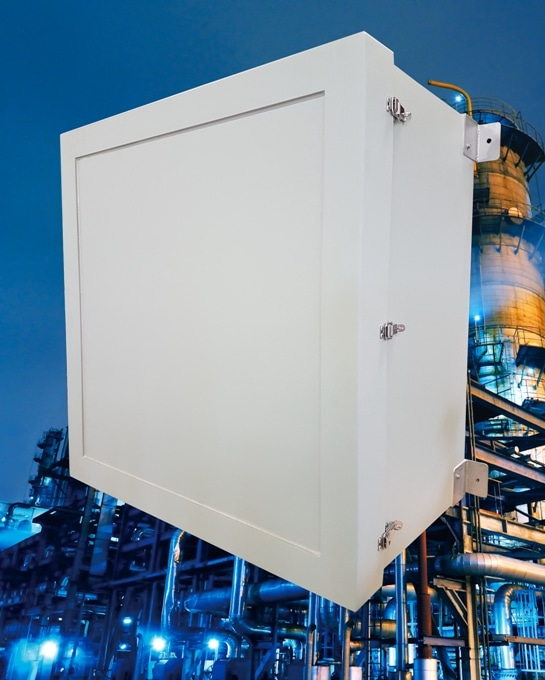Intertec's new Hot Box for outdoor process sampling applications can deliver high temperatures up to 150°C/300°F in compact footprints. The new hot boxes employ a combination of conduction and convection heating assisted by a novel air circulation system.
 Intertec's new Hot Box for outdoor process sampling applications can deliver high temperatures in compact footprints.
Intertec's new Hot Box for outdoor process sampling applications can deliver high temperatures in compact footprints.
Protective enclosures are usually necessary for analyzer applications, and are a major contributor to overall costs. The compact hot boxes make it possible to provide elevated temperature environments for sampling systems in small form factors, This greatly simplifies installations close to the process lines being tested - to minimize sample lag time and substantially reduce the hidden costs of analyzer installations such as heated sample lines.
For many instrumentation applications in chemical and petrochemical plants, and especially for analyzer sample conditioning systems, it is essential to maintain an elevated temperature in order to prevent condensation or crystallisation of the media and corresponding inaccuracy of results. Complete insulation of measurement and analysis stations is rarely possible due to requirements for maintenance and calibration. Intertec's easy-access hot boxes provide an efficient heating solution thanks to the way they are constructed, using high-performance insulation sandwiched between sheets of GRP (glassfiber reinforced polyester). All of the materials have low thermal conductivity, and the sandwich construction means that enclosures can be fabricated using bonding techniques, avoiding the 'thermal short cuts' between inner and outer shells that metal enclosures and metal fixings create. The overall thermal insulation of a sandwich-construction GRP enclosure is typically more than twice as good as a steel enclosure with the same insulation thickness, and provides a highly stable environment for maintaining elevated temperatures. Among many applications, the hot boxes are helping plant operators to implement the monitoring and analysis required to meet new flare stack combustion rules.
The new hot boxes use electric heaters that have a flat side for conductive heat transfer, and a finned side for efficient heat transfer to the internal atmosphere using convection. The conductive face of the heater is attached to an aluminium plate. The sampling equipment is assembled onto a second detachable plate, which bolts onto the heated plate with the assistance of thermal transfer paste for optimal heat conductivity. The heaters are designed for hazardous area (potentially explosive) applications and employ positive temperature coefficient or PTC cartridges. As their electric resistance increases with rising temperature, the heaters are self limiting, ensuring that the surface temperature will never exceed the maximum temperature of the listed temperature class. Intertec's electric heating systems meet an exceptional range of hazardous area approvals including IEC, ATEX, CSA/NRTL, EAC, and many other national certificates for countries including China, Brazil and South Korea.
The exact temperature inside the hot box is controlled by Intertec's explosion proof smart controller, which provides programmable digital PID (proportional-integral-derivative) control. The temperature sensor for the controller can be mounted at the optimum position in the enclosure to ensure accurate control.
As the style of self-limiting heater used reduces heat output as temperature increases, Intertec has designed a novel feature to improve operational performance. A processing plant's instrument air service can be connected to provide a very low flow, which is introduced into the enclosure via perforated tubing that releases the air between the fins of the heater(s). This air flow continually moves the warmer air away from the heater, which as a result then maintains a higher heat output. With the heating system running at a higher rate, hot temperatures can be achieved both more quickly and very evenly throughout the enclosure's interior, and measurement cycle times can be reduced. Hot Box enclosures will also support purging if required.
In this way, Intertec can make hot boxes capable of providing certified hazardous area electric heating for temperatures up to 150°C/300°F in small footprints, complete with doors for simple maintenance and operator access. These highly insulated GRP hot boxes can be designed to be completely weather resistant, allowing large savings to be made in the installation and ownership costs of process analyzers.
Another major possibility of Intertec's GRP-based hot boxes is shape optimization. The construction techniques used for GRP make it simple to create special shapes - further simplifying online analyzer and sampling applications located close to the process. www.intertec.info